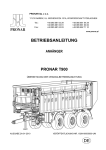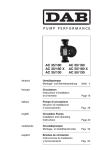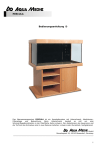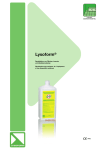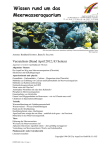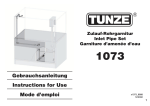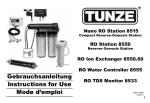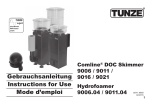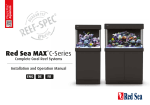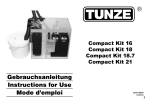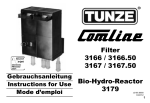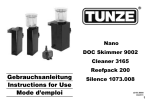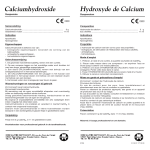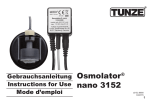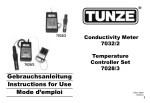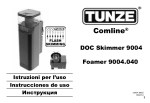Download Gebrauchsanleitung für Tunze Calcium Dispenser 5074.000
Transcript
Calcium Dispenser 5074 Gebrauchsanleitung Instructions for Use Mode d’emploi x5074.8888 02/2012 1 TUNZE® Aquarientechnik GmbH Seeshaupter Straße 68 82377 Penzberg Germany Tel: +49 8856 2022 Fax: +49 8856 2021 www.tunze.com Email: [email protected] 2 Seite Inhalt 4 Allgemeines 6 Lieferform 6 Funktion 6 Kit 68 8-10 Sicherheitshinweise 12 Befestigung im Vorratsbehälter 5002.25 14 Befestigung in anderen Behältern Befestigung des Calcium Dispensers 16 mit Halter an senkrechter Glasscheibe 16 Platzierung des Zulaufschlauches 18 Inbetriebnahme 20 Regelmäßige Nachfüllung 22 Pflege / Reinigung des Ventils Zusammenwirken von Calcium 24 Dispenser und Calcium Automat 26-28 Wichtige Hinweise für den Gebrauch 30-32 Dosierbeispiele für Calciumhydroxid 34 Ersatzteile 36 Garantie 38-46 Störungen Table of contents Page General aspects 5 Delivery condition 7 Functions 7 Kit 68 7 Safety instructions 9-11 Attachment in the storage container 5002.25 13 Attachment in other containers 15 Attachment of the calcium dispenser to a vertical glass pane by means of a holder 17 Placing the feed hose 17 Initial operation 19 Regular refill 21 Maintenance / cleaning of the valve 23 Combined action of the calcium dispenser and the automatic calcium dispenser 25 Important notes on use 27-29 Examples for calcium hydroxide dosing 31-33 Spare parts 34 Guarantee 37 Failures 39-47 Page Sommaire 5 Généralités 7 Contenu 7 Fonctions 7 Kit 68 9-11 Sécurité d’utilisation 13 Fixation dans le réservoir 5002.25 15 Fixation dans d’autres conteneurs Fixation de Calcium Dispenser sur 17 paroi verticale avec support 17 Placement du tuyau d’amenée d’eau 19 Mise en service 21 Recharge périodique 23 Entretien / Nettoyage du clapet Effets conjugués de Calcium Dispenser 25 et Calcium Automat 27-29 Remarques d’utilisation importantes 31-33 Exemples de dosage en hydroxyde 34 Pièces de rechange 37 Garantie 39-47 Que faire si ? 3 Allgemeines Der TUNZE® Calcium Dispenser 5074 (1) wird zur kontinuierlichen Zugabe von Calcium in Riffbecken eingesetzt. Er ist ein Calciumhydroxid Reaktor, der aus einer Mischung von Wasser und Calciumhydroxid, das sogenannte „Kalkwasser“ direkt ins Becken einleitet. Er ist geeignet bis ca. 1.000L Steinkorallenaquarien. Die Zugabe von Calcium kann auch mit einer zweiten Methode durchgeführt werden: Mit einem Kalkreaktor, z. B. dem TUNZE® Calcium Automat (2), wird durch Einsatz von Kohlensäure (CO2) Kalkgranulat gelöst und ins Becken eingeführt (siehe Wirkungsweise von Calcium Dispenser und Calcium Automaten). Wichtiger Hinweis Für den Betrieb des Calcium Dispensers 5074 wird die Wasserstandsregelung TUNZE® Osmolator 3155 benötigt. Der Anschluß erfolgt zwischen der Dosierpumpe und dem Zulaufschlauch des Osmolators. 4 General aspects Généralités TUNZE® calcium dispenser 5074 (1) is used for continuous dosing of calcium to reef tanks. It is a calcium hydroxide reactor which feeds a mixture of water and calcium hydroxide, the so-called „kalkwasser“, directly into the tank. It can be fitted in hard coral tanks up to about 1,000 l (264 Usgal.). Calcium can also be added by means of a second method: A calcium reactor, such as TUNZE® automatic calcium dispenser (2), uses carbon dioxide (CO2) to dissolve lime granulate and feeds the solution into the tank (see chapter titled „Combined action of the calcium dispenser and the automatic calcium dispenser“). TUNZE® Calcium Dispenser 5074 (1) est conçu pour réaliser des apports continuels de calcium en aquarium récifal. C’est un réacteur à calcium réalisant une solution saturée en d’hydroxyde de calcium „Kalkwasser“ directement conduite dans l’aquarium. TUNZE® Calcium Dispenser est prévu pour un aquarium de coraux durs jusqu’à 1000L. La seconde méthode d’apports calciques par réacteur à calcaire TUNZE® Calcium Automat (2) utilise la dissolution du substrat calcaire par de l’acide carbonique (CO2), voir Effets conjugués de Calcium Dispenser et Calcium Automat. Important note Water level regulator TUNZE® Osmolator 3155 is required for the operation of Calcium Dispenser 5074. The unit is connected between the metering pump and the feed hose of the Osmolator. Remarque importante Calcium Dispenser 5074 nécessite l’utilisation d’une régulation de niveau d’eau TUNZE® Osmolator 3155. Calcium Dispenser se place entre la pompe de dosage de l’Osmolator et le rejet d’eau vers l’aquarium. 5 Lieferform Der TUNZE® Calcium Dispenser 5074 wird einbaufertig mit Mischbehälter, Halter, Schlauch, Rückschlagventil und Calciumhydroxid geliefert. Funktion Der Calcium Dispenser wird von der Dosierpumpe des Osmolators mit Wasser versorgt. Immer wenn die Dosierpumpe verdunstetes Wasser nachfüllt, gelangt das Wasser in den Calcium Dispenser und wird so mit Calciumhydroxid angereichert. Auf diese Weise gelangt „Kalkwasser“ ins Aquarium, ohne dem Risiko eines zu hohen pH-Wertes. Diese Kalkwasserzugabe bringt eine perfekte Anreicherung an Karbonaten und eine Phosphatausfällung als feste Teile. Diese gebundenen Phosphate werden über den Abschäumer aus dem Aquarium entfernt. Die anfallende Kalkausfällung und deren Sedimente können von einem Schnellfilter aufgenommen werden. Kit 68 5002.25 + 5074 Kit 68 6 + 3155 Die Zusammenstellung Kit 68 besteht aus Calcium Dispenser 5074, Osmolator Universal 3155 sowie einen Vorratsbehälter 5002.25. Delivery condition Contenu Functions Fonctions The TUNZE® calcium dispenser 5074 is supplied ready for mounting with mixing container, holder, hose, non-return valve and calcium hydroxide. The calcium dispenser is provided with water by the metering pump of the Osmolator. Whenever the metering pump tops up any evaporated water, the water passes through the calcium dispenser and thus is enriched with calcium hydroxide. In this way the „kalkwasser“ is added to the tank without the risk of an excessively high pH value. This addition of „kalkwasser“ ensures a perfect enrichment in carbonates and phosphate precipitation as solids. The skimmer removes these fixed phosphates from the tank. The lime precipitation and the sediments produced can be removed by a fine sediment filter. Kit 68 Kit 68 consists of a calcium dispenser 5074, Osmomat Universal 3155 as well as a storage container 5002.25. TUNZE® Calcium Dispenser 5074 est livré complet avec corps mélangeur, support, tuyau, clapet antiretour et hydroxyde de calcium. Calcium Dispenser est alimenté en eau par la pompe de dosage de l’Osmolator. Lors de chaque séquence de complément d’évaporation, l’eau traverse tout d’abord Calcium Dispenser et s’enrichie en hydroxyde de calcium, une solution qui limite le risque d’une montée brutale et dangereuse du pH dans aquarium. Ces apports calciques apportent un enrichissement en carbonates mais aussi une liaison des phosphates évacuées ensuite par l’écumeur. Les précipitations sédimentaires sont éliminées par la filtration mécanique rapide. Kit 68 Le Kit 68 regroupe Calcium Dispenser 5074 et Osmolator Universal 3155 dans un réservoir 5002.25. 7 Sicherheitshinweise Vorsicht Verletzungsgefahr! Calciumhydroxid Ca(OH)2 ist ein starkes Reizmittel, deshalb direkten Kontakt mit Augen und Haut vermeiden. Beim Hantieren unbedingt Schutzbrille und Handschuhe tragen (1) ! Calciumhydroxid unbedingt von Kindern fernhalten und an einem Ort lagern, der für Kinder nicht zugänglich ist (2) ! Dieses Gerät ist für Benutzer (einschl. Kinder) mit eingeschränkten physischen, sensorischen oder psychischen Fähigkeiten bzw. ohne jegliche Erfahrung oder Vorwissen nur dann geeignet, wenn eine angemessene Aufsicht oder ausführliche Anleitung zur Benutzung des Gerätes durch eine verantwortliche Person sichergestellt ist. Die Kalkmilch (ungelöstes Calciumhydroxid mit Wasser) nicht direkt ins Aquarium geben, es besteht Gefahr für die Aquarienbewohner. 8 Safety instructions Sécurité d’utilisation Danger of injury ! Calcium hydroxide Ca(OH)2 is a strong irritant, for this reason avoid any direct contact with the eyes and skin. Wear safety goggles and gloves whilst handling (1) ! Keep calcium hydroxide away from children; keep in a safe place which is not accessible for children (2) ! This device is suitable for users (including children) with limited physical, sensorial or mental abilities or without any experience or previous knowledge, if suitable supervision or detailed instructions on the operation of the device is provided by a responsible person. Do not add the milk of lime (undissolved calcium hydroxide in water) to the tank directly; danger to the inhabitants in the aquarium. Attention, risques de blessures ! L’hydroxyde de calcium Ca(OH)2 est un produit fortement irritant, évitez tout contact direct avec la peau et les yeux. Lors des manipulations, portez gants et lunettes de protection (1) ! Tenir hors de portée des enfants, stocker en un endroit inaccessible aux enfants (2) ! Les utilisateurs (enfants inclus) ayant des limitations physiques, sensorielles, psychiques, ne bénéficiant pas d’une expérience ou de connaissances suffisantes ne peuvent utiliser cet appareil qu’avec le concours d’une tierce personne responsable, assurant la surveillance ou veillant à l’observation du mode d’emploi. N’introduisez pas de lait de chaux (eau + hydroxyde de calcium non dissout) directement dans l’aquarium : risques pour les animaux. 9 Sicherheitshinweise Das Kalkpulver nicht direkt in den Vorratsbehälter oder ins Aquarium schütten, es besteht Gefahr für Aquarienlebewesen und Tauchpumpen (3). Nur reines Calciumhydroxid verwenden, das Laborquallität bzw. hohen Reinheitsgrad aufweist. Nur Calciumhydroxid in Pulverform einsetzen. Calcium Dispenser nur in Behältern betreiben, die Schlauchverbindungen sind nicht für den Betrieb außerhalb geeignet. Es besteht Leckgefahr nach längerer Zeit (4). Pumpen und Heizer regelmäßig auf Verkalkung prüfen, spätestens nach 6 Monaten gründlich reinigen. Gebrauchsanleitung gut aufbewahren. 10 Safety instructions Sécurité d’utilisation Do not pour the lime powder into the storage tank or the aquarium directly; danger to the inhabitants in the aquarium and to the submerged pumps (3). N’introduisez pas directement de l’hydroxyde de calcium dans un réservoir ou dans l’aquarium : risques pour les animaux et les pompes immergeables (3). Use pure calcium hydroxide only which has laboratory quality or a high degree of purity. Use powdered calcium hydroxide only. Use the calcium dispenser in containers only; the hose connections are not suitable for any outside operation. After a longer period of operation there is a danger of leakage (4). Check the pumps and heaters for furring in regular intervals; clean thoroughly after six months at the latest. N’utilisez que de l’hydroxyde de calcium de grande pureté, qualité laboratoire ou équivalente. Calcium Dispenser doit être utilisé dans un réservoir car la jonction de ses tuyaux n’est pas conçue pour une utilisation externe : risque de détachement après une longue période (4). Vérifiez régulièrement l’entartrage des chauffages et des pompes, nettoyage minimum tous les 6 mois. Veuillez consulter le mode d’emploi avec attention. Keep the operating instructions in a safe place. 11 Befestigung im Vorratsbehälter 5002.25 Geeigneten Platz für den Calcium Dispenser (1) im Vorratsbehälter (2) bestimmen, auf leichten Zugang beim Befüllen achten. Lochschiene (3) mit beiliegender Schraube M6x15mm und Mutter (4) im oberen Bereich des Vorratsbehälters (ca. 2cm vom oberen Rand) befestigen. Dazu sollten Sie ein Loch Ø 6mm bohren, falls dies nicht schon vorhanden ist. Schiebeteil (5) auf Lochschiene einsetzen. Zulaufschlauch des Osmolators ca.30 cm vom Pumpenausgang der Dosierpumpe (6) entfernt durchschneiden. Dispenser an den Wasserzufluss anschließen und dabei Rückschlagventil (7) zwischen Dispenser und Pumpenausgang einsetzen. Auf Durchflussrichtung achten! Beiliegendes Schlauchstück (8) mit unterem Anschluß verbinden. Schläuche mit beiliegendem Kabelbinder (9) fixieren. Zweites Stück des Zulaufschlauches am Ausgang (10) des Dispensers anstecken und zum Aquarium führen. Ende des Zulaufschlauches mittels Halter am Aquarium sichern. Darauf achten, dass das Schlauchende nicht in die Wasseroberfläche eintauchen kann. Gefahr des Rücklaufes, siehe „Befestigung des Zulaufschlauches“. Osmolator nach separater Anleitung montieren. 12 Attachment in the storage container 5002.25 Fixation dans le réservoir 5002.25 Use the enclosed M6 x 15 mm screw and nut (4) to attach the perforated rail (3) in the upper area of the storage container (approx. 2 cm away from the upper edge). For this purpose, please drill a hole 6 mm in diameter, if not provided already. Place the sliding part (5) on the perforated rail. Fixez la barre de montage (3) en zone supérieure du réservoir (env. 2cm du bord) par la vis M6X15mm et son écrou (4). Si besoin, percez un trou diam. 6mm. Glissez la pièce coulissante (5) sur la barre. Determine a suitable place for the calcium dispenser (1) in the storage container (2) ensuring easy access for filling. Cut the feed hose of the Osmolator off approx. 30 cm (11.8 in.)from the pump outlet of the metering pump (6). Connect the dispenser to the water inflow, and in the process place the non-return valve (7) between the dispenser and the pump output. Observe the flowing direction ! Fit the enclosed piece of hose (8) to the lower connection. Use the cable fasteners (9) enclosed to fix the hoses. Fit the second piece of the feed hose to the output (10) of the dispenser and pass on to the aquarium. Secure the end of the feed hose to the aquarium by means of the holder. Please ensure that the hose end cannot be submerged. Danger of return flow; cf. „Attachment of the feed hose“. Fit the Osmolator according to the separate instructions. Dans le réservoir (2), choisissez un emplacement convenant à Calcium Dispenser (1) et garantissant son remplissage facile. Coupez le tuyau de l’Osmolator à env. 30 cm de la sortie de la pompe (6). Intégrer le Dispenser dans le circuit d’eau, montez le clapet anti-retour (7) entre la pompe et le Dispenser. Veillez au sens de passage! Raccordez le tuyau fourni (8) sur l’entrée basse du Dispenser. Solidarisez les tuyaux à l’aide du collier fourni (9). Raccordez la deuxième partie du tuyau (10) allant vers l’aquarium sur la sortie du Dispenser. Fixez l’extrémité de ce tuyau à l’aquarium par son support, sortie bien au-dessus de la surface de l’eau afin d’éviter tout retour d’eau, voir Placement du tuyau d’amenée d’eau. Montez l’Osmolator conformément à sa notice d’utilisation. 13 Befestigung in anderen Behältern Der Calcium Dispenser (1) kann im Vorratsbehälter 5002.25 oder anderen Kunststoff- bzw. Glasbehältern eingesetzt werden. Die Größe dieser Behälter sollte zur Aufnahme des ganzen Dispensers geeignet sein(Länge 350 x ø140mm). Das Volumen richtet sich jedoch ausschließlich nach den Sicherheitsanforderungen des Osmolators. Bei einem anderen Kunststoffbehälter wird die Befestigung wie beim TUNZE® Vorratsbehälter 5002.25 ausgeführt. Bei Glasbehältern sollte der Calcium Dispenser (1) nur an einer senkrechten Glasscheibe montiert werden. 14 Attachment in other containers Fixation dans d’autres conteneurs The calcium dispenser (1) can be placed in storage container 5002.25 or in other plastic or glass containers. The size of this container should be suitable to house the whole dispenser (length 350 x diam. 140 mm / length 13.7 x diam. 5.5 in.)). However, the volume depends exclusively on the safety requirements of the Osmolator. Calcium Dispenser (1) se place dans un réservoir 5002.25 ou dans tout autre conteneur en plastique ou en verre adapté à l’encombrement (haut. 350mm x diam. 140mm). Le volume total du conteneur doit se conformer aux indications de l’Osmolator. In case of another plastic container, the unit is attached like in the TUNZE® storage container 5002.25. In case of glass containers, the calcium dispenser (1) should be fitted to a vertical glass pane only. Pour les conteneurs plastiques, la fixation est identique à celle du réservoir 5002.25. Dans une cuve en verre, Calcium Dispenser (1) se fixe uniquement sur une paroi verticale. 15 Befestigung des Calcium Dispensers mit Halter (2) an senkrechter Glasscheibe Halter vormontieren. Einstellen der Glasstärke (max.19mm) mit der unteren Schraube (3). Klemmschraube (4) anziehen, auf festen Sitz achten. Position des Dispensers einstellen. Hierzu die Lasche (5) anheben, das Schiebeteil (6) in die gewünschte Position schieben und Lasche einrasten. Dispenser einhängen (7). Platzierung des Wasserzulaufes Schlauchende (8) immer deutlich über dem Wasserspiegel befestigen, dadurch wird ein möglicher Wasserrücklauf in den Vorratsbehälter vermieden. Kalkwasser immer direkt in der Nähe des Ausgangs der Strömungspumpe einleiten, das ermöglicht eine bessere Verteilung im Becken. 16 Hinweis: Kalkwasser niemals in ruhige Zonen oder in einen Filterkasten (Comline Filter, Unterschrankfilter, Abschäumerbehälter, etc.) einleiten. Attachment of the calcium dispenser to a vertical glass pane by means of holder (2) Fixation de Calcium Dispenser sur paroi verticale avec support (2) Pre-mount the holder. Procédez à un premier assemblage du support. Use the lower screw (3) to set the glass thickness (max. 19 mm / .74 in.). Ajustez à l’épaisseur du verre (max. 19mm) par la vis de réglage inférieure (3). Tighten the clamping screw (4); ensure a tight fit. Serrez la vis de serrage supérieure (4), veillez à la bonne assise. Set the position of the dispenser. For this purpose, lift the bracket (5), place the sliding part (6) in the requested position, and permit the bracket to snap in. Suspend the dispenser (7). Placing the feed hose Always fit the hose end (8) well over the water level to prevent a potential water reflux into the storage container. Always feed the „kalkwasser“ directly in the vicinity of the output of the circulation pump, which permits a better distribution in the tank. Note: Never feed the „kalkwasser“ in quiet zones or in a filter chamber (Comline filter, cabinet filter, skimmer tank, et cetera). Ajustez la position du Dispenser. Pour cela, maintenez le verrouillage en translation (5), glissez le support à la hauteur désirée puis libérez le verrouillage jusqu’à son enclenchement.. Accrochez le Dispenser (7). Placement du tuyau d’amenée d’eau Afin d’éviter un retour d’eau dans le réservoir par amorçage, veuillez toujours fixer le tuyau d’amenée (8) bien au-dessus de la surface de l’eau. Déversez toujours le Kalkwasser près de la sortie d’une pompe de brassage garantissant une meilleure répartition dans le bac. Remarque : ne jamais conduire le Kalkwasser dans des zones calmes ou dans des cuves de filtrations (filtre Comline, filtre sous aquarium, compartiment d’écumeur, etc.). 17 Inbetriebnahme Calcium Dispenser aus Halterung abheben und Schraubdeckel öffnen. (1) Bestimmte Menge an Calciumhydroxid (2) einfüllen (3) und Osmosewasser bis 1cm unter den oberen Rand auffüllen. Dosierangaben siehe Abschnitt „Dosierbeispiele“. Dispenser mit Deckel wieder verschließen (4) und anschließend schütteln, um eine gute Durchmischung zu erzielen. Dispenser in Halterung einhängen und für 15 Minuten ruhen lassen (5). Anschließend Osmolator in Betrieb nehmen. 18 Initial operation Mise en service Remove the calcium dispenser from the holder and open the screw cap. (1) Retirez Calcium Dispenser de son support puis ouvrez le bouchon à vis (1). Fill (3) a certain quantity of calcium hydroxide (2) and top up with osmosis water up to 1 cm (.39 in.) below the upper edge. For dosing, please refer to the chapter titled „Examples for calcium hydroxide dosing“. Introduisez une certaine charge (3) en hydroxyde de calcium (2) puis rajoutez de l’eau osmosée jusqu’à 1 cm du bord supérieur. Pour le dosage, voir „Exemples de dosage en hydroxyde“. Use the cap to close (4) the dispenser again, and shake well to obtain a good mixture. Suspend the dispenser in the holder, and permit to settle for 15 minutes (5). Subsequently start up the Osmolator again. Refermez le bouchon puis agitez (4) afin d’obtenir un bon mélange. Repositionnez Dispenser dans son support puis laissez décanter durant 15 min (5). Passé ce temps, enclenchez Osmolator. 19 Regelmäßige Nachfüllung Wir empfehlen die Nachfüllung mit Calciumhydroxid Art.Nr. 5074.50 alle 7-10 Tage. Osmolator ausschalten. Dispenser von Halterung abheben und Schraubdeckel öffnen. Wasser, der Menge von ca. 2 Suppenlöffeln (1) entsprechend aus Dispenser ausgießen und durch bestimmte Menge an Calciumhydroxid ergänzen, siehe dazu den Abschnitt „Dosierbeispiele“. Dispenser mit Deckel verschließen und schütteln. Dispenser in Halterung einhängen und für 15 Minuten ruhen lassen. Anschließend Osmolator wieder in Betrieb nehmen. Hinweis: Wir empfehlen, eine bestimmte Calciumdosis wöchentlich nachzufüllen. Dieser Zeitabstand sollte auch mit der Nachfüllung für den Vorratsbehälter des Osmolators übereinstimmen (2). 20 Regular refill Recharge périodique We recommend refilling the calcium hydroxide, article No. 5074.50, every seven to ten days. Switch off the Osmolator. Remove the calcium dispenser from the holder and open the screw cap. Remove water to the amount of approx. 2 table spoons (1) from the dispenser and compensate by a certain quantity of calcium hydroxide – cf. chapter titled „Examples for calcium hydroxide dosing“. Use the cap to close the dispenser; shake the unit well. Suspend the dispenser in the holder, and permit to settle for 15 minutes. Subsequently start up the Osmolator again. Note: We recommend trefilling a certain amount of calcium every week. This period of time should also correspond to the refilling of the storage container of the Osmolator (2). Nous préconisons le remplissage à l’aide d’hydroxyde de calcium réf. 5074.50 tous les 7 à 10 jours. Stoppez Osmolator Retirez Calcium Dispenser de son support puis ouvrez le bouchon à vis. Retirez l’équivalent de 2 cuillères à soupe d’eau du Dispenser et remplacez par une certaine charge (1) en hydroxyde de calcium, voir „Exemples de dosage en hydroxyde“. Refermez le bouchon puis agitez afin d’obtenir un bon mélange. Repositionnez Dispenser dans son support puis laissez décanter durant 15 min. Passé ce temps, enclenchez Osmolator. Remarque : Nous préconisons un remplissage hebdomadaire d’une certaine charge en hydroxyde. Cette période devrait correspondre au remplissage du réservoir de l’Osmolator (2). 21 Pflege / Reinigung des Ventils Wir empfehlen, den Calcium Dispenser ca. alle 3 Monate zu entleeren und mit klarem Wasser zu spülen. Dabei werden die entstandenen Ablagerungen (Kalkreste) entfernt. Bei starker Verkalkung drei Suppenlöffel Essig oder Essigessenz in den Reaktor geben und mit Wasser auffüllen. Einige Stunden einwirken lassen, danach mit klarem Wasser spülen und schon ist der Dispenser für den Weiterbetrieb bereit. Hinweis: Dosierpumpe nur in Osmosewasser betreiben, beim Ansaugen von Schmutz kann das Rückschlagventil beschädigt werden. Reinigung des Ventils Bei Fehlfunktion z.B. Rücklauf des Wassers oder langsames entleeren des Dispensers, sollte das Rückschlagventil 5074.01 gereinigt werden. Rückschlagventil in ein Glas mit Essig oder Essigessenz tauchen (1) und mit einer Spritze in Pfeilrichtung ansaugen (2). 15 Minuten einweichen lassen und 2 bis 3 Mal wiederholen. Danach unter klarem Wasser gut spülen und wieder einsetzten! 22 Maintenance / cleaning of the valve Entretien / Nettoyage du clapet Cleaning the valve In case of malfunction such as return flow of water or slow discharge of the dispenser, the Non-Return Valve 5074.01 has to be cleaned. Dip the non-return valve in a glass of vinegar (1) and use a syringe to draw in in direction of the arrow (2). Permit to soak for fifteen minutes, and repeat two to three times. Subsequently rinse well in plain water and reinstall again ! Nettoyage du clapet En cas de mauvais fonctionnement, par exemple un retour d’eau dans le réservoir ou la vidange lente du Dispenser, il est nécessaire de nettoyer le clapet anti-retour 5074.01. Immergez le clapet anti-retour dans un verre d’eau contenant du vinaigre blanc ou de l’acide dilué (1) et aspirez dans le sens de la flèche à l’aide d’une seringue (2). Laissez tremper 15 minutes et renouvelez 2 à 3 fois l’opération. Rincez le clapet à l’eau claire, il est prêt à une nouvelle utilisation ! We recommend emptying the calcium dispenser every three months, and to rinse it with plain water. In the process any deposits (lime residue) are removed. In case of heavy furring, put three tablespoons of vinegar into the reactor and top up with water. Permit to react for some hours; subsequently rinse with plain water, and the dispenser is ready for operation again. Note: Operate the metering pump in osmosis water only; if debris is drawn in, the non-return valve may be damaged. Afin d’évacuer le calcium résiduel, nous préconisons de vider et de rincer Calcium Dispenser à l’eau claire tous les 3 mois. Lors de fortes précipitations calciques, introduisez 3 cuillères de vinaigre dans le réacteur puis remplissez d’eau. Laissez agir quelques heures puis rincez, le Dispenser est à nouveau prêt au fonctionnement. Remarque : n’utilisez la pompe de dosage que dans de l’eau osmosée. Lors de l’aspiration de grosses particules, le clapet anti-retour peut être bouché ou détérioré. 23 Zusammenwirken von Calcium Dispenser und Calcium Automat Beim Einsatz des Dispensers zusammen mit dem Calcium Automat 3170 sind keine speziellen Vorkehrungen zu treffen. Der Dispenser hat nicht nur einen positiven Einfluss auf den pH-Wert (geringfügige Anhebung), sondern erhöht auch die Leistung des Calcium Automats. Deswegen könnte eine Erhöhung des Sollwertes am pH-Meter 7074/2 (1) (CO2-Steuerung für den Calcium Automat) notwendig werden. Wir empfehlen ebenfalls die regelmäßige Messung von KH (Art.Nr.7014/2) und Calcium (2) (Art. Nr.7015/2). Gute Werte in einem gesunden Korallenriffaquarium sind z.B : KH: 8 – 10° und Calcium : 400 – 500 mg/l. 24 Combined action of the calcium dispenser and the automatic calcium dispenser Effets conjugués de Calcium Dispenser et Calcium Automat No special measures have to be taken for the combined action of the calcium dispenser and Automatic Calcium Dispenser 3170. La mise en service de Calcium Dispenser en complément de Calcium Automat 3170 ne demande aucune disposition particulière. Not only does the dispenser have a positive influence on the pH value (slight increase), it also increases the performance of the automatic calcium dispenser. For this reason, the setpoint value may have to be increased at the pH Meter 7074 (1) (CO2 control for the automatic calcium dispenser). Calcium Dispenser n’a pas qu’un effet positif sur le pH moyen du bac (légère augmentation), il accroît encore le rendement de Calcium Automat. Il pourrait alors être nécessaire de réajuster la consigne pH du Controller pH 7074/2 (1) assurant le pilotage en CO2 de Calcium Automat. We recommend a measurement of the carbonate hardness (article No. 7014/2) and calcium (2) (article No. 7015/2) in regular intervals as well. Good values in a healthy coral reef aquarium are, for example: carbonate hardness: 8° to 10° and calcium: 400 to 500 mg/l. Nous conseillons une mesure régulière de KH (réf. 7014/2) et du taux de calcium (réf. 7015/2) (2). Un aquarium récifal sain devrait posséder les valeurs suivantes : KH : 8 - 10° all. et calcium : 400 - 500 mg/l. 25 Wichtige Hinweise für den Gebrauch Beim Entnehmen von Wasser, Steinen, Korallen oder Tieren aus dem Aquarium, kann es zu einer überhöhten Zufuhr von Calciumhydroxid aus dem Calcium Dispenser kommen und deshalb zu einem erhöhten pH-Wert führen. Zur Vermeidung muss eine entsprechende Wassermenge, als Volumenausgleich, direkt von Hand ins Becken nachgefüllt werden. Vor Neubefüllung des Calcium Dispensers, Filter zuerst reinigen! Sollte der Filterwechsel unmittelbar nach der Neubefüllung erfolgen (mit weniger als 15min Wartezeit), besteht die Gefahr, dass ungelöstes Calciumhydroxid direkt in das Aquarium gelangt und Verätzungen an Aquarienbewohnern hervorruft! Für einen Calcium Dispenser sollte nicht mehr als ca. 0,3 Liter Wasser pro Einschaltzyklus verwendet werden. Das Wasserniveau von Vorratsbehälter zu Aquarium sollte 160cm nicht überschreiten. 26 Important notes on use Remarques d’utilisation importantes When water, stones, corals or animals are removed from the aquarium, the calcium dispenser may release an excessive amount of calcium hydroxide, which will lead to an increased pH value. In order to prevent this from happening, a corresponding amount of water has to be filled into the tank by hand as a compensation of volume. Prior to refilling the calcium dispenser, the filter has to be cleaned ! If the change of filter is carried out directly after the refill (with a waiting period of less than 15 minutes), there is a risk of undissolved calcium hydroxide getting into the aquarium directly, causing irritation of the inhabitants in the aquarium. No more than approx. 0.3 litres (10 fl oz.) of water per operating cycle should be used for a calcium dispenser. The water level between storage container and the surface of aquarium should not exceed 160 cm (62.9 in.). Une extraction d’eau, de pierres, de coraux ou d’animaux de l’aquarium peut conduire à un surdosage en hydroxyde de calcium et à un pH trop élevé. Pour cela, un volume d’eau équivalent doit être rajouté manuellement et directement à l’aquarium et non par le Dispenser. Les filtres doivent toujours être nettoyés avant le remplissage du Dispenser. Si le nettoyage devait intervenir après un remplissage (avec un temps de décantation de moins de 15 min.), il subsiste un risque de dommages aux animaux par introduction d’hydroxyde non dissout! Le volume d’eau déversé durant un cycle de fonctionnement de Calcium Dispenser ne doit pas dépasser 0,3 L. La distance entre le niveau d’eau du réservoir et la surface de l’aquarium ne doit pas dépasser 160 cm. 27 Wichtige Hinweise für den Gebrauch Die Kalkwassermenge, die in das Aquarium gelangen kann, ist von der Verdunstung abhängig. Es ist daher mit einem erheblichen Unterschied (bis zur Hälfte) zwischen einem abgedeckten und offenen Aquarium zu rechnen! Eine Abweichung der Kalkwasserzufuhr zwischen Sommer und kühleren Jahreszeiten ist auch möglich. Wir empfehlen, eine monatliche Kontrolle und Reinigung bei Dosierpumpe, Dispenser und Rückschlagventil durchzuführen. Schraubdeckel des Dispensers immer geschlossen halten, um Kontakt mit der Umgebungsluft und eine Umwandlung des Calciumhydroxids zu Calciumcarbonat (Kalk) zu vermeiden. Bei unsachgemäßem Gebrauch des Calcium Dispensers kann es zu starken Kalkablagerungen an Aquarienpumpen und Heizern kommen. Deswegen müssen diese Komponenten regelmäßig geprüft und gereinigt werden (1). Das Nachfüllwasser für den Dispenser sollte immer Osmosewasserqualität sein (2). 28 Important notes on use Remarques d’utilisation importantes The volume of „kalkwasser“, which is dosed into the aquarium, depends on the evaporation. For this reason, a considerable difference (up to 50 per cent) has to be expected between a covered and an uncovered aquarium ! La quantité de Kalkwasser introduite dans l’aquarium est fonction de l’évaporation. Dans ces conditions, comptez sur une variation importante (jusqu’à moitié) entre un bac ouvert et un bac fermé. Des différences d’apports calciques entre l’été et les saisons plus fraîches sont possibles. A deviation of the „kalkwasser“ feed between the hotter and cooler months of the year is possible as well. We recommend a monthly check and cleaning of the metering pump, dispenser and non-return valve. Always keep the screw cap of the dispenser closed in order to prevent any reaction with the ambient air causing a conversion of the calcium hydroxide into calcium carbonate (lime). In case of incorrect application of the calcium dispenser, heavy lime deposits may occur at the aquarium pumps and heaters. For this reason, these components have to be checked and cleaned in regular intervals (1). Nous conseillons un contrôle et un nettoyage mensuel de la pompe de dosage et du clapet antiretour. Veuillez bien fermer le bouchon du Dispenser afin d’éviter un contact du Kalkwasser avec l’air ambiant et sa précipitation en carbonate de calcium. L’utilisation inconsidérée de Calcium Dispenser peut conduire à un entartrage des pompes immergeables et des chauffages. Pour cela, veuillez contrôler et nettoyer régulièrement ces composants (1). L’eau de rajout utilisée pour le Dispenser doit toujours être de qualité osmosée (2). The water refilled in the dispenser should always be of osmotic water quality (2). 29 Dosierbeispiele für Calciumhydroxid Die Angaben sind für offene Meerwasseraquarien und maximale Verdunstung. Dosiermenge:1 Kaffeelöffel mit Calciumhydroxid entspricht ca. 5 g Die empfohlenen Daten sind vom Tierbesatz abhängig. Dosierbeispiel (1) Riffbecken mit weniger als 180 L Inhalt: Zugabe von 10 g Calciumhydroxid in den Calcium Dispenser alle 10 Tage. Dosierbeispiel (2) Weichkorallenaquarium mit 150 – 400 L, oder Riffbecken, besetzt vorwiegend mit Steinkorallen jedoch mit weniger als 180 L Inhalt: ausgestattet mit Calcium Dispenser, Zugabe von 10g Calciumhydroxid pro Woche oder Calcium Automat 3170 und Calcium Dispenser, bei einer Zugabe von 10g Calciumhydroxid alle 10 Tage. 30 Examples for calcium hydroxide dosing Exemples de dosage en hydroxyde The data are applicable for open marine aquariums and maximum evaporation. Dosing amount: 1 teaspoon of calcium hydroxide corresponds to about 5 g (.17 oz.). The recommended dose depends on the livestock. Ces indications valent pour un aquarium marin ouvert avec une évaporation maximale. Dosage : 1 cuillère à café d’hydroxyde correspond env. à 5 g. Les dosages conseillés dépendent fortement du peuplement. Dosing example (1) Reef tank with a content of less than 180 litres (47.5 USgal.): Add 10 g (.35 oz.) of calcium hydroxide to the calcium dispenser every ten days. Dosing example (2) Leather coral tank with a volume of 150 to 400 litres (39 to 105 USgal.) or reef tank, primarily populated by hard corals, but with a content of less than 180 litres (47.5 USgal.): Equipped with calcium dispenser, add 10 g (.35 oz.) of calcium hydroxide per week; equipped with Automatic Calcium Dispenser 3170 and calcium dispenser, add 10 g (.35 oz.) of calcium hydroxide every ten days. Exemple de dosage (1) Bac récifal de moins de 180 litres : Rajout de 10 g d’hydroxyde de calcium dans le Calcium Dispenser tous les 10 jours. Exemple de dosage (2) Bac de coraux mous de 150 à 400 litres ou de bac coraux durs de moins de 180 litres : Avec Calcium Dispenser seul, rajout de 10 g d’hydroxyde par semaine. Avec Calcium Automat 3170 et Calcium Dispenser, rajout de 10 g d’hydroxyde tous les 10 jours. 31 Dosierbeispiele für Calciumhydroxid Dosierbeispiel (3) Weichkorallenaquarium mit 400 – 1000 L, oder Riffbecken, besetzt vorwiegend mit Steinkorallen jedoch mit 150-400 L Inhalt: ausgestattet mit Calcium Dispenser und 20g Calciumhydroxid-Zugabe pro Woche oder Calcium Automat 3170 und Calcium Dispenser, bei einer Zugabe von 10g Calciumhydroxid pro Woche. Dosierbeispiel (4) Weichkorallenaquarium mit 1000 – 2000 L, oder Riffbecken, besetzt vorwiegend mit Steinkorallen jedoch mit 400-1000L Inhalt: ausgestattet mit Calcium Dispenser mit 30g Calciumhydroxid pro Woche oder Calcium Automat 3170 und Calcium Dispenser, bei einer Zugabe von 20g Calciumhydroxid pro Woche. 32 Examples for calcium hydroxide dosing Exemples de dosage en hydroxyde Dosing example (3) Leather coral tank with a volume of 400 to 1,000 litres (105 to 264 USgal.) or reef tank, primarily populated by hard corals, but with a content of between 150 to 400 litres (39 to 105 USgal.): Equipped with calcium dispenser, add 20 g (.7 oz.) of calcium hydroxide per week; equipped with Automatic Calcium Dispenser 3170 and calcium dispenser, add 10 g (.35 oz.) of calcium hydroxide per week. Exemple de dosage (3) Bac de coraux mous de 400 à 1000 litres ou bac de coraux durs de 180 à 400 litres : Avec Calcium Dispenser seul, rajout de 20 g d’hydroxyde par semaine. Avec Calcium Automat 3170 et Calcium Dispenser, rajout de 10 g d’hydroxyde par semaine. Dosing example (4) Leather coral tank with a volume of 1,000 to 2,000 litres (264 to 528 USgal.) or reef tank, primarily populated by hard corals, but with a content of between 400 to 1,000 litres (105 to 264 USgal.): Equipped with calcium dispenser, add 30 g (1 oz.) of calcium hydroxide per week; equipped with Automatic Calcium Dispenser 3170 and calcium dispenser, add 20 g (.7 oz.) of calcium hydroxide per week. Exemple de dosage (4) Bac de coraux mous de 1000 à 2000 litres ou bac de coraux durs de 400 à 1000 litres : Avec Calcium Dispenser seul, rajout de 30 g d’hydroxyde par semaine. Avec Calcium Automat 3170 et Calcium Dispenser, rajout de 20 g d’hydroxyde par semaine. 33 Teileabbildung • Illustration of parts • Illustration des pièces 34 List of spare parts Calcium Dispenser Liste des pièces Calcium Dispenser 1 3174.112 Schraubdeckel mit Dichtung Screw cap and seal Bouchon à vis+ joint 5074.000 Ersatzteilliste Calcium Dispenser 2 5074.500 Calciumhydroxid 250g Calcium hydroxide - 250 g (.55 lbs.) Calciumhydroxid 250g 3 3000.220 Lochschiene Mounting bar Barre de montage 4 3000.230 Schiebeteil für Halter Sliding unit Pièce coullissante PVC hose - diam. 4 x 7 mm x 3 Tuyau PVC, ø4 x 7mm x 3m 5 5000.390 PVC-Schlauch, ø4 x 7mm x 3m m (diam. .15 x .27 x 118.1 in.) 6 5074.010 Rückschlagventil für Wasser Non-return valve water Clapet anti-retour pour l‘eau 7 3000.245 Kabelbinder Cable fastener Colliers de serrage 8 3000.240 Klemmhalter Clamp holder Attache de support Screw set Set de vis 8a 3000.243 Schraubenset Die Teileabbildung zeigt die mitgelieferten Einzelteile. Die Ersatzteilliste enthält auch Teile die von den Teileabbildungen abweichen können. The illustration shows the individual parts supplied. The list of spare parts may also contain parts which deviate from the illustrations. L’illustration des pièces indique les différentes pièces utilisées. La liste de pièces détachées comporte aussi des pièces pouvant différer de cette illustration. 35 Garantie TUNZE® Aquarientechnik GmbH Seeshaupter Straße 68 82377 Penzberg Germany Tel: +49 8856 2022 Fax: +49 8856 2021 www.tunze.com Email: [email protected] 36 Für das von TUNZE hergestellte Gerät wird für einen Zeitraum von vierundzwanzig (24) Monaten ab dem Kaufdatum eine begrenzte Garantie gewährt, die sich auf Material- und Fabrikationsmängel erstreckt. Im Rahmen der entsprechenden Gesetze beschränken sich Ihre Rechtsmittel bei Verletzung der Gewährleistungspflicht auf die Rückgabe des von TUNZE hergestellten Gerätes zur Reparatur oder zum Ersatz, was im Ermessen des Herstellers liegt. Im Rahmen der entsprechenden Gesetze sind dies die einzigen Rechtsmittel. Folgeschäden und sonstige Schäden sind ausdrücklich davon ausgeschlossen. Defekte Geräte müssen in der Originalverpackung zusammen mit dem Kassenzettel in einer freigemachten Sendung an den Händler oder den Hersteller gesandt werden. Unfreie Sendungen werden vom Hersteller nicht angenommen. Garantieausschluss besteht auch für Schäden durch unsachgemäße Behandlung (z.B. Wasserschäden), technische Änderungen durch den Käufer, oder durch Anschluss an nicht empfohlene Geräte. Technische Änderungen, insbesondere die der Sicherheit und dem technischen Fortschritt dienen, behält sich der Hersteller vor. Guarantee The unit manufactured by TUNZE Aquarientechnik GmbH carries a limited guarantee for a period of twenty-four (24) months after the date of purchase covering all defects in material and workmanship. Within the framework of the corresponding laws, your remedies in case of a violation of the guarantee obligation shall be limited to returning the unit manufactured by TUNZE Aquarientechnik GmbH for repair or replacement at the discretion of the manufacturer. Within the framework of the corresponding laws, the said shall be the only remedies. Consequential damage and/or other damage shall be excluded therefrom explicitly. Defect units shall have to be shipped to the dealer or the manufacturer in the original packaging together with the sales slip in a pre-paid consignment. Unpaid consignments will not be accepted by the manufacturer. Exclusion from guarantee shall exist also in case of damage caused by inexpert handling (such as water damage), technical modification carried out by the buyer or by connection to devices which have not been recommended. Subject to technical modifications, especially those which further safety and technical progress. Garantie Cet appareil manufacturé par TUNZE® bénéficie d’une garantie limitée à une durée légale de vingt quatre mois (24) à partir de la date d’achat et concernant les vices de fabrication et de matériaux. Dans le cadre des lois correspondantes, les voies de recours lors d’un dommage se limitent au retour de l’appareil produit par TUNZE® à son service réparation ou au remplacement de l’appareil ce qui reste de l’appréciation du fabriquant. Dans le cadre des lois correspondantes, il s’agit de l’unique voie de recours. D’autres dommages et dégâts en sont catégoriquement exclus. Les appareils défectueux doivent être expédiés dans leur emballage d’origine, accompagnés du bordereau de caisse dans un envoi affranchi à l’adresse du commerçant ou du fabricant. Les envois non affranchis ne sont pas acceptés par le fabricant. L’exclusion de garantie concerne aussi les dégâts par traitement incorrect (par exemple des dégâts causés par l’eau), les modifications techniques effectuées par l’acheteur ou le raccordement à des appareillages non recommandés par le fabricant. Le fabricant se réserve le droit d’effectuer des modifications techniques, en particulier dans le domaine de la sécurité et du progrès technique. 37 Störung: Es läuft kein Wasser aus dem Zulaufschlauch heraus. Ursache: Schlauchausgang mit Kalk verstopft. Abhilfe: Schlauch reinigen, besonders den Ausgang (Kontakt zwischen Kalkwasser und Luft). Ursache: Pumpe ist ohne Wasser gelaufen und hat Luft eingezogen. Abhilfe: Durch Schütteln Pumpe entlüften oder Schlauch entfernen. Ursache: Rückschlagventil verschmutzt. Abhilfe: Ventil entnehmen und einige Tropfen Essig einfüllen, danach mit klarem Wasser spülen, ggf. Ventil erneuern. 38 Failure: No water comes out of the feed hose. Cause: The hose outlet is clogged with lime. Remedy: Clean the hose, in particular the outlet (contact between „kalkwasser“ and air). Cause: The pump has been operated without water and has drawn air. Remedy: De-aerate the pump by shaking or remove the hose. Cause: The non-return valve is soiled. Remedy: Remove the valve and fill some drops of vinegar, then rinse with clear water; replace the valve, if and when necessary. Disfonctionnements: L’eau ne s’écoule pas par le tuyau d’amenée vers l’aquarium. Raisons: Sortie bouchée par le calcaire. Solutions: Nettoyez le tuyau et tout particulièrement son extrémité (contact avec l’air). Raisons: La pompe a fonctionné sans eau et comporte une poche d’air. Solutions: Evacuez l’air en secouant la pompe ou en détachant le tuyau. Raisons: Le clapet anti-retour est sale. Solutions: Déposez le clapet, introduisez quelques gouttes de vinaigre puis rincez. Remplacez le clapet. 39 Störung: Das Kalkwasser ist milchig und trübt das ganze Aquarienwasser. Ursache: Bei Nachfüllung des Dispensers mit Calciumhydroxid wurde der Osmolator gleich wieder in Betrieb genommen. Abhilfe: Der Osmolator benötigt eine Pause von 15 Minuten (Ruhezeit). Ursache: Dosierzeit länger als 2 Minuten. Abhilfe: Nach Filterwechsel ist die Wassernachdosierung zu lang. Wasser von Hand einfüllen. Ursache: Calcium Dispenser hängt nicht richtig im Universalhalter. Abhilfe: Calcium Dispenser soll immer genau senkrecht hängen. 40 Failure: The „kalkwasser“ is milky and clouds the entire aquarium water. Cause: The Osmolator was operated immediately after the dispenser had been filled with calcium hydroxide. Remedy: The Osmolator requires a break of fifteen minutes (rest time). Disfonctionnements: Le Kalkwasser est laiteux et trouble l’ensemble du bac. Raisons: Lors d’une recharge du Dispenser en hydroxyde, l’Osmolator a été mis de suite en service. Solutions: Observez absolument un temps de pause de l’Osmolator de 15 minutes. Cause: Dosing time longer than 2 minutes. Remedy: After the filter change the water metering period is too long. Add water by hand. Raisons: Temps de dosage supérieur à 2 minutes. Solutions: Après un nettoyage de filtre, le temps de dosage est trop long. Rajoutez l’eau manuellement. Cause: The calcium dispenser is not suspended properly in the universal holder. Remedy: The calcium dispenser has to be suspended absolutely vertically. Raisons: Calcium Dispenser n’est pas correctement accroché dans son support. Solutions: Calcium Dispenser doit toujours travailler verticalement. 41 Störung: Der pH-Wert im Becken ist über 8,5, die Fische und Korallen fühlen sich nicht wohl. Ursache: Dosierzeit von Osmolator ist zu lang. Abhilfe: Beim Entnehmen von Wasser, Steinen, Korallen oder Tieren aus dem Aquarium kann es zur Überdosierung des Calcium Dispensers und damit zu einen höheren pH-Wert kommen. Zur Vermeidung dieselbe Wassermenge von Hand direkt ins Becken nachfüllen. Ursache: Becken zu jung und noch nicht eingefahren. Abhilfe: Im Becken besteht noch kein Gleichgewicht, das Kalkwasser wirkt sehr aggressiv auf die Tiere. Deshalb die Kalkwasserzugabe stoppen und den Tierbesatz erhöhen. Ursache: Calciumhydroxid Dosierung ist ungeeignet für das Becken. Abhilfe: Das Becken ist zu klein (z.B. unter 100 L) für eine Kalkwasserzugabe und muss es besser angepasst werden, siehe „Beispiele“. 42 Failure: The pH value in the tank is over 8.5; the fish and coral do not feel well. Cause: The metering time of the Osmolator is too long. Remedy: When water, stones, corals or animals are removed from the aquarium, the calcium dispenser may release an excessive amount of calcium hydroxide, which will lead to an increased pH value. To prevent this from happening, top up the same amount of water by hand. Disfonctionnements: Le pH du bac dépasse 8,5, les poissons et coraux montrent des signes d’inconfort. Raisons: Le temps de dosage d’Osmolator est trop long. Solutions: Une extraction d’eau, de pierres, de coraux ou d’animaux de l’aquarium peut conduire à un surdosage en hydroxyde de calcium et à un pH trop élevé : un volume équivalent doit être rajouté manuellement et directement. Cause: The tank is too young and not run in yet. Remedy: The tank is not in an equilibrium; the „kalkwasser“ has a very aggressive action on the animals. For this reason, stop the addition of „kalkwasser“ and increase the livestock. Raisons: Le bac trop jeune n’est pas assez mûr. Solutions: Le bac ne connaît pas encore d’équilibre et le Kalkwasser agit de manière agressive sur les animaux. Stoppez ces ajouts et augmentez le peuplement. Cause: Calcium hydroxide dosing is unsuitable for this tank. Remedy: The tank is too small (below 100 l (26.5 USgal.) for the addition of „kalkwasser“, and has to be adapted better (cf. chapter titled “Examples”). Raisons: Le dosage en hydroxyde de calcium est inadapté au bac. Solutions: Le bac est trop petit (moins de 100 litres) pour les rajouts de Kalkwasser et doit être mieux adapté, voir Exemples de dosage. 43 Störung: Calcium Dispenser fördert zu wenig Calcium ins Becken, bzw. Calciumgehalt nach längerer Betriebszeit unter 400mg/l. Ursache: Calciumhydroxid-Zugabe im Dispenser zu gering. Abhilfe: Pulvermenge besser anpassen, siehe „Dosierbeispiele“. Ursache: Becken ist abgedeckt und hat zu wenig Verdunstung. Abhilfe: Calcium Automat 3170 sollte zusätzlich eingesetzt werden. Ursache: Methode nicht ausreichend für dieses Biotop. Abhilfe: Calcium Automat 3170 sollte zusätzlich eingesetzt werden. 44 Failure: The calcium dispenser delivers too little calcium into the tank or the calcium content is below 400 mg/l after a longer period of operation. Cause: The addition of calcium hydroxide in the dispenser is too low. Remedy: Adapt the amount of powder; cf. chapter titled „Examples for calcium hydroxide dosing“. Cause: The tank is covered and has too little evaporation. Remedy: Calcium Automat 3170 should be used in addition. Cause: The method is not suitable for this biotope. Remedy: Calcium Automat 3170 should be used in addition. Disfonctionnements: Calcium Dispenser n’apporte pas assez de calcium à l’aquarium, taux de calcium de moins de 400 mg/l après une longue période d’utilisation. Raisons: Les dosages en hydroxyde dans le Dispenser sont trop faibles. Solutions: Veuillez adapter les dosages, voir Exemples de dosages. Raisons: Le bac est couvert et ne possède pas assez d’évaporation. Solutions: Calcium Automat 3170 doit être rajouté en complément. Raisons: Méthode insuffisante pour ce biotope. Solutions: Calcium Automat 3170 doit être rajouté en complément. 45 Störung: Nach Inbetriebnahme vom Calcium Dispenser gibt der Osmolator regelmäßig Alarm. Ursache: Rückschlagventil ist falsch montiert oder defekt. Abhilfe: Montage überprüfen, ggf. Rückschlagventil erneuern. Ursache: Förderhöhe der Dosierpumpe ist zu niedrig. Abhilfe: Das Wasserniveau von Vorratsbehälter zu Aquarium sollte 160cm nicht überschreiten. 46 Failure: After the initial operation of the calcium dispenser, the Osmolator releases an alarm in regular intervals. Cause: The non-return valve has been fitted incorrectly or is defective. Remedy: Check the installation; replace nonreturn valve, if and when necessary. Disfonctionnements: Après mise en place de Calcium Dispenser, l’Osmolator se met régulièrement en alarme. Raisons: Le clapet anti-retour est mal monté ou défectueux. Solutions: Vérifiez le montage, remplacez le clapet anti-retour. Cause: The delivery height of the metering pump is too low. Remedy: The water level between storage container and the surface of aquarium should not exceed 160 cm (62.9 in.). Raisons: La hauteur de refoulement de la pompe de dosage est trop faible. Solutions: La distance entre le niveau d’eau du réservoir et la surface de l’aquarium ne doit pas dépasser 160 cm. 47 Unsere neue Webseite ist eine direkte Brücke zwischen TUNZE® und Aquarianern. Our new website is a direct link between TUNZE® and the aquarists. Notre nouveau site Internet est une liaison directe entre TUNZE® et les aquariophiels. www.tunze.com 48
















































